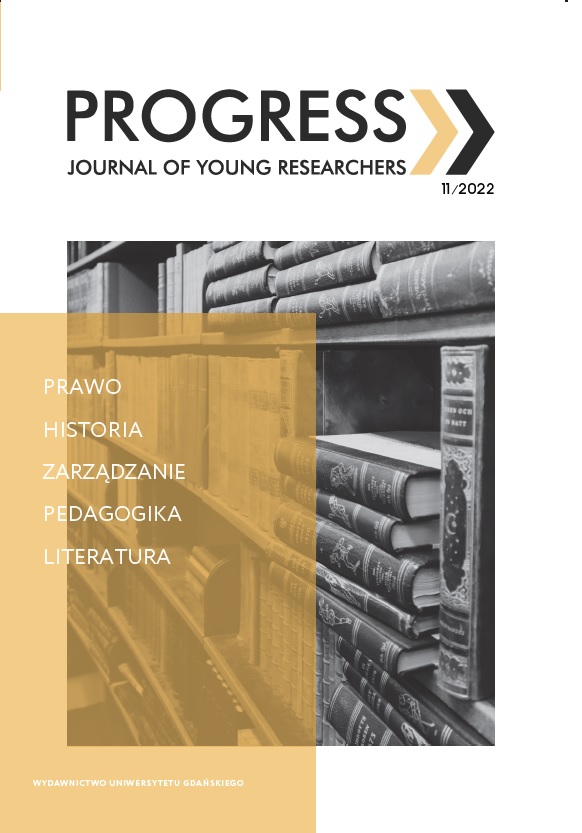Around the concept of agnotology in the contemporary pedagogical discourse
DOI:
https://doi.org/10.26881/prog.2022.11.03Keywords:
critical pedagogy, agnotology, emancipation, pedagogy of ignorance, Jacques RanciereAbstract
In presented text I would like to overview interpretative efforts concerned with the conception of agnotology within pedagogical thoughts, especially in the context of fail the idea of emancipation in the stream of critical pedagogy. I recall the works of Tomasz Szkudlarek, Gert Biesta and Jacques Rancière to show the productive and positively valuated meanings of the concept of agnotology and also document its „work” in the pedagogical discourse. As we will see we have to deal with peculiar pedagogy of ignorance. The most valuable are the efforts of Rancière in this field, who is the most recognizable figure in the battle with the myths of emancipation expressed in the theory of critical pedagogy and sociology of knowledge. The category of agnotology and the pedagogy of ignorance seems to be the sign of unknown meanings in the pedagogical thinking, which give the contribution of that category in the attempt to transcend the myths of emancipation.
Downloads
References
Bachmann-Medick D., 2012, Cultural Turns. Nowe kierunki w naukach o kulturze, przeł. K. Krzemieniowa, Warszawa.
Bauman Z., 2007, Płynne życie, przeł. T. Kunz, Kraków.
Bauman Z., 2008, Zindywidualizowane społeczeństwo, przeł. O. i W. Kubińscy, Gdańsk.
Bauman Z., 2009, Konsumowanie życia, przeł. M. Wyrwas-Wiśniewska, Kraków.
Biesta G., 2005, Against Learning. Reclaiming a Language for Education in an Age of Learning, „Nordisk Pedagogik”, No. 1.
Biesta G., 2006, Beyond Learning: Democratic Education for a Human Future, London.
Biesta G., 2007, Why „What Works” Won’t Work: Evidence-Based Practice and the Democratic Deficit in Educational Research, „Educational Theory”, No. 1.
Biesta G., 2010, Education, Weakness, Existence, the Soul and Truth: Five Reminders about the Basic Questions of Education, „Ars Educandi”, No. VII.
Biesta G., 2010, The New Logic of Emancipation, „Educational Theory”, No. 1.
Biesta G., 2013, The Beautiful Risk of Education. Boulder – London.
Biesta G., 2016, Ryzykując wolność innych istot ludzkich: o pięknym ryzyku edukacji, w: Ryzyko jako warunek rozwoju. Transformatywne aspekty edukacji, red. K. Węc, A. Wierciński, Toruń.
Biesta G., 2017, The Rediscovery of Teaching, London.
Błajet P., Przyborowska B., 2012, What Can „Integral” Mean in Education?, „Kultura i Edukacja”, nr 6.
Bridges D., 2008, Educationalization: On the appropriateness of asking educational institutions to solve social and economic problems, „Educational Theory”, No. 4.
Depaepe M., Smeyers P., 2008, Educationalization as an ongoing modernization process, „Educational Theory”, No. 4.
Gutek G., 2003, Filozoficzne i ideologiczne podstawy edukacji, przeł. A. Kacmajor, A. Sulak, Gdańsk.
Gutek G., 2007, Filozofia dla pedagogów, przeł. A. Kacmajor, A. Sulak, Gdańsk.
Hodgson N., Vlieghe J., Zamojski P., 2018, Education and the Love for the World: Articulating a Post-Critical Educational Philosophy, „Foro de Educación”, No. 16.
Hutcheon L., 1989, The Politics of Postmodernism, London – New York.
Krzykawski M., 2018, Co nam dzisiaj po Jacques’u Rancierze?, „Teksty Drugie”, nr 6.
Labaree D.F., 2008, The Winnings Ways of Losing Strategy: Educationalization of Social Problems in the United States, „Educational Theory”, No. 4.
Lambeir B., Ramaekers S., 2008, Humanizing Education and The Educationalization of Health, „Educational Theory”, No. 4.
Lewartowska-Zychowicz M., 2010, Homo liberalis jako projekt edukacyjny. Od emancypacji do funkcjonalności, Kraków.
Lyotard J.F., 1997, Kondycja ponowoczesna: raport o stanie wiedzy, przeł. M. Kowalska, J. Migasiński, Warszawa.
Miron L., 2002, The Zen of Revolutionary Pedagogy: Is There A Middle Path?, „Educational Theory”, No. 3(52).
Ostrowicka H., 2015, Przemyśleć z Michelem Foucaultem. Edukacyjne dyskursy o młodzieży. Dyspozytyw i urządzanie, Kraków.
Ostrowicka H., 2015, Urządzanie młodzieży. Studium analityczno-krytyczne, Kraków.
Rancière J., 1991, The Ignorant Schoolmaster: Five Lessons in Intellectual Emancipation, Stanford, CA.
Rancière J., 2020, O nauczycielach, którzy nie wiedzą, Poznań, Warszawa.
Simons M., Masschelein, J., 2006, The Learning Society and Governmentality: An Introduction, „Educational Philosophy and Theory”, No. 4.
Smeyers P., Depaepe M., 2008, Educational Research: The Educationalization of Social Problems, „Educational Research”, No. 3.
Starego K., 2016, Poza dyskurs kompetencji w edukacji krytycznej. „Trzeci termin” oraz Paula Freirego i Jaquesa Rancière’a idea dialogu „zapośredniczonego”, „Forum Oświatowe”, nr 1(28).
Szkudlarek T., 2001, Ekonomia i moralność: przemieszczenia dyskursu edukacyjnego, „Teraźniejszość – Człowiek – Edukacja”, numer specjalny.
Szkudlarek T., 2005, Globalizacja, ekonomia i edukacja: o metaforze ludzkiego kapitału w polityce oświatowej, w: Pedagogika i edukacja wobec nowych wspólnot i różnic w jednoczącej się Europie. Materiały z IV Zjazdu Pedagogicznego, red. E. Malewska, B. Śliwerski, Kraków.
Szkudlarek T., 2008, Dyskursywna konstrukcja podmiotowości., „Puste znaczące” a pedagogika, „Forum Oświatowe”, numer specjalny.
Szkudlarek T., 2017, On the Politics of Educational Theory, London – New York.
Szkudlarek T. (red.), 2013, Education and the Political: New Theoretical Articulations, Rotterdam.
Szkudlarek T., Mendel M., 2013, Kryzys jako dyskurs i narracja. Konteksty edukacyjne, „Forum Oświatowe”, nr 3.
Taylor C., 2010, Nowoczesne imaginaria społeczne, Kraków.
Trohler D., 2013, Between Universally Claimed Theory and common Understanding. Theoretical Knowledge in Education, w: Making a Difference in Theory. The Theory Question in Education and the Education Question in Theory, eds. G. Biesta, J. Allan, R. Edwards, London – New York.
Downloads
Published
How to Cite
Issue
Section
License
Copyright (c) 2022 Author(s)

This work is licensed under a Creative Commons Attribution 4.0 International License.

 Academic Scientific Journals
Academic Scientific Journals




